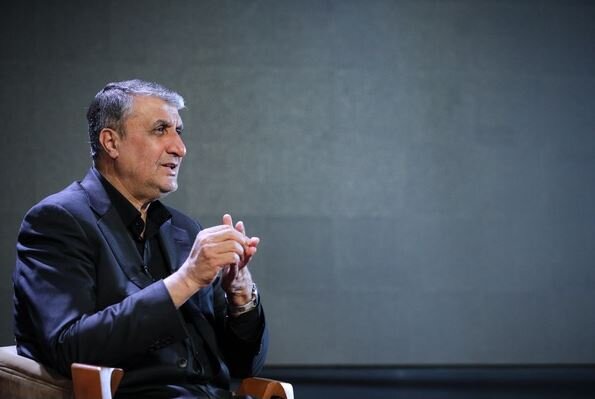Iranian nuclear products now present in global markets: nuclear chief

TEHRAN – Iran has successfully broken the monopoly in nuclear technology, allowing Iranian services and products to penetrate global markets, Mohammad Eslami, the head of the Atomic Energy Organization of Iran (AEOI), announced.
Eslami made the remarks during an interview with the Office for the Preservation and Publication of the Works of Ayatollah Seyyed Ali Khamenei, the Leader of the Islamic Revolution. He declared that various countries have been purchasing Iranian heavy water and receiving services from Iranian specialists. The nuclear chief also emphasized that Iran is now positioned to export radiopharmaceuticals to countries around the world.
“Our capabilities in nuclear technology have enabled us to provide services and products that are now present in global markets,” Eslami stated. “Given our capacity and production potential, we can export radiopharmaceuticals to all parts of the world.”
Eslami further elaborated on the global demand for radiopharmaceuticals, stating, “Radiopharmaceuticals have a wide global market, and there is significant demand for various types of products. As long as the transportation service can deliver these medicines, we have the capability to provide services and produce products.”
The official also announced that following the success of the 1st International Conference on Nuclear Science and Technology held in Esfahan this year, several countries have requested educational and research collaboration with Iran
‘Iran has the legal right to scale back on JCPOA commitments when other parties violate the pact’
During the interview, the nuclear chief also reaffirmed Tehran’s commitment to safeguarding its rights within the framework of the Non-Proliferation Treaty (NPT) and the Joint Comprehensive Plan of Action (JCPOA). Eslami emphasized that Iran will continue to operate transparently and precisely in its nuclear activities, stating, "We must fully transparently, precisely, and committedly safeguard the rights of the nation, the rights of the country, and our own legitimate rights."
Addressing the ongoing tensions surrounding the JCPOA, Eslami pointed out that while Iran has adhered to its obligations under the agreement, other parties have failed to meet their commitments. "The JCPOA was a treaty with obligations from both parties and in addition to our obligations, they also had their own," he remarked. He referred to paragraph 36 of the JCPOA, which allows Iran to reduce its commitments if the other party does not fulfill theirs. "We are currently operating within the framework of this document. They have not fulfilled their commitments, and we are also entitled to reduce our commitments," he explained.
Eslami made it clear that if other parties return to their commitments under the JCPOA, Iran would reciprocate: "Whenever they decide to return to fulfilling their commitments under this agreement, we will also return."
Highlighting the significance of domestic legislation, Eslami praised the Strategic Action Law for the Removal of Sanctions as a crucial measure in countering external pressures. "This law has been effective and useful, bringing us closer to our goals," he noted. He emphasized that it has provided a powerful response to what he described as "an enemy that is unilaterally, illegally, and contrary to international norms trying to stop or restrict Iran's nuclear industry."
Under the influence of this law, Eslami asserted that Iran has made significant strides in its nuclear capabilities. "We have transitioned from the research phase to the industrial phase. Significant steps have been taken over the past two years," he declared.
Leave a Comment